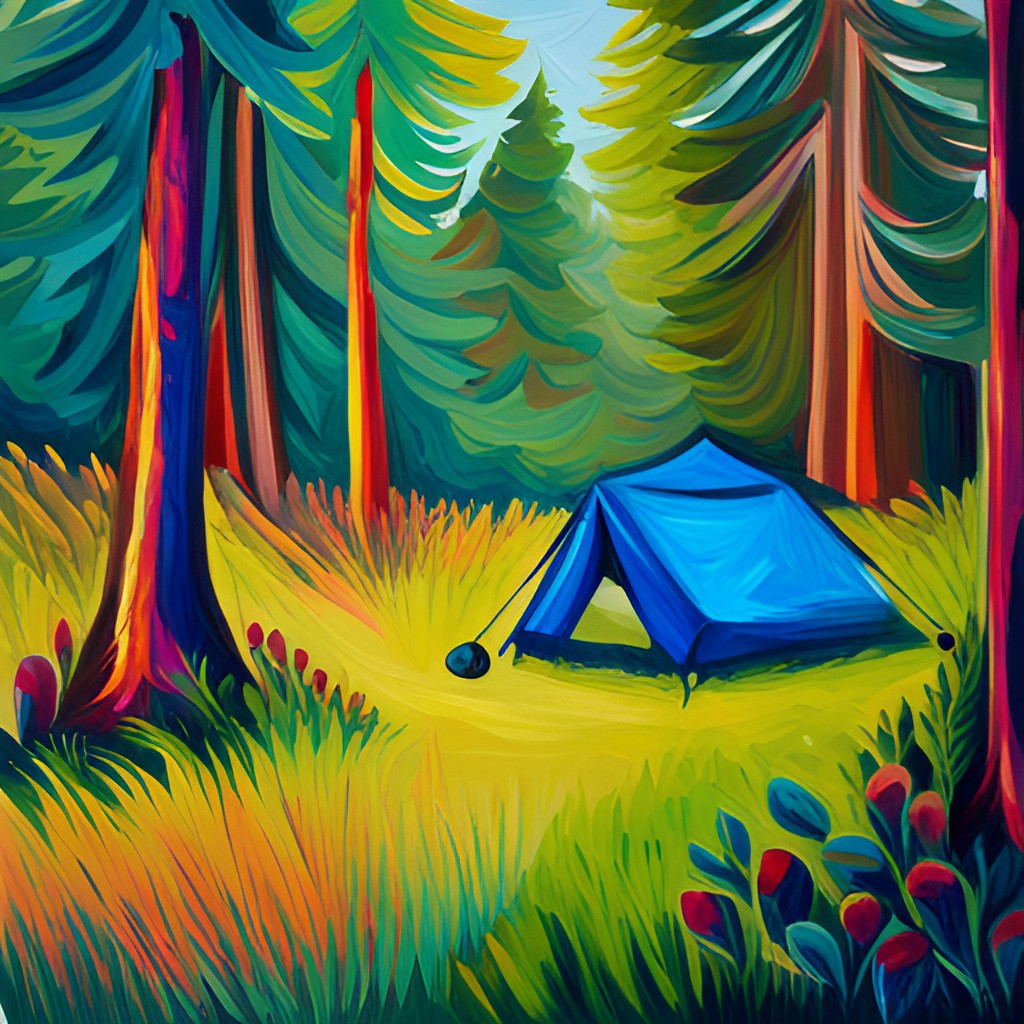
Going on a tent camping adventure allows us to immerse ourselves in the unparalleled beauty of nature. However, it’s essential to recognize that responsible waste management is vital in preserving the environment and safeguarding wildlife. Among the crucial aspects of this responsibility is the proper storage of trash, aimed at minimizing odors and deterring animals from our campsite.
Mismanaged trash leads to an unpleasant camping experience due to odors and unwanted pests and disrupts the delicate balance of ecosystems, posing potential harm to wildlife. Following simple guidelines, we can ensure that our trash is stored securely, reducing smells and keeping animals safe.
This guide will teach you how to store trash during a tent camping trip. From selecting suitable trash storage containers to implementing odor-control measures, we will provide practical tips and techniques to help maintain a clean and animal-resistant campsite.
By adopting responsible waste management practices, we enhance our enjoyment of the camping experience and actively contribute to preserving the natural environment’s beauty and integrity for future generations.
- The Importance of Proper Trash Storage in Tent Camping – How to Store Trash During a Tent Camping Trip
- 1. Environmental Preservation – The Importance of Proper Trash Storage in Tent Camping
- 2. Wildlife Protection – The Importance of Proper Trash Storage in Tent Camping
- 3. Safety and Hygiene – The Importance of Proper Trash Storage in Tent Camping
- 4. Leave-No-Trace Ethic – The Importance of Proper Trash Storage in Tent Camping
- Choosing the Right Trash Storage Containers for Tent Camping – How to Store Trash During a Tent Camping Trip
- 1. Sturdy and Durable Containers – Choosing the Right Trash Storage Containers for Tent Camping
- 2. Size Considerations – Choosing the Right Trash Storage Containers for Tent Camping
- 3. Portable and Lightweight Options – Choosing the Right Trash Storage Containers for Tent Camping
- 4. Odor-Resistant Features – Choosing the Right Trash Storage Containers for Tent Camping
- 5. Bear-Resistant Containers (If Applicable) – Choosing the Right Trash Storage Containers for Tent Camping
- 6. Compatibility with Trash Bags – Choosing the Right Trash Storage Containers for Tent Camping
- Proper Disposal of Food Waste During Tent Camping – How to Store Trash During a Tent Camping Trip
- 1. Minimize Food Waste – Proper Disposal of Food Waste During Tent Camping
- 2. Pack Perishable Foods in Sealed Containers – Proper Disposal of Food Waste During Tent Camping
- 3. Utilize Reusable Food Storage Bags or Containers – Proper Disposal of Food Waste During Tent Camping
- 4. Separate Food Waste from Regular Trash – Proper Disposal of Food Waste During Tent Camping
- 5. Properly Dispose of Food Waste – Proper Disposal of Food Waste During Tent Camping
- 6. Clean Cooking and Eating Utensils – Proper Disposal of Food Waste During Tent Camping
- Setting Up a Dedicated Trash Storage Area in Camping Areas – How to Store Trash During a Tent Camping Trip
- Securing Trash Containers for Tent Camping Trips – How to Store Trash During a Tent Camping Trip
- 1. Ensuring Containers Have Tight-Fitting Lids – Securing Trash Containers for Tent Camping Trips
- 2. Using Bungee Cords or Straps to Secure Lids in Place – Securing Trash Containers for Tent Camping Trips
- 3. Avoiding Leaving Containers Unattended or Exposed – Securing Trash Containers for Tent Camping Trips
- 4. Store Overnight Trash Securely – Securing Trash Containers for Tent Camping Trips
- 5. Clean and Rinse Trash Containers Regularly – Securing Trash Containers for Tent Camping Trips
- Odor Control Techniques When Camping – How to Store Trash During a Tent Camping Trip
- 1. Double-bagging Trash to Contain Odors – Odor Control Techniques When Camping
- 2. Using Odor-absorbing Materials like Baking Soda or Charcoal – Odor Control Techniques When Camping
- 3. Keeping Trash Containers Away from Direct Sunlight and Heat – Odor Control Techniques When Camping
- Additional Tips for Odor Control – Odor Control Techniques When Camping
- How to Properly Manage the Trash During a Camping Trip – How to Store Trash During a Tent Camping Trip
- How to Deal with Smelly Trash Situations During a Tent Camping Trip – How to Store Trash During a Tent Camping Trip
- Bear-Proofing Techniques for Trash in a Camping Area – How to Store Trash During a Tent Camping Trip
- Properly Disposing of Trash After the Camping Trip – How to Store Trash During a Tent Camping Trip
- 1. Find Designated Waste Disposal Sites or Recycling Centers – Properly Disposing of Trash After the Camping Trip
- 2. Separate Recyclable Materials – Properly Disposing of Trash After the Camping Trip
- 3. Dispose of Trash and Recyclables Accordingly – Properly Disposing of Trash After the Camping Trip
- 4. Clean and Store Trash Containers for Future Use – Properly Disposing of Trash After the Camping Trip
- Conclusion – How to Store Trash During a Tent Camping Trip
- Frequently Asked Questions – How to Store Trash During a Tent Camping Trip
The Importance of Proper Trash Storage in Tent Camping – How to Store Trash During a Tent Camping Trip
Proper trash storage is not just a minor detail in tent camping; it holds significant importance for campers and the environment. By understanding the reasons behind the need for proper trash management, we can fully grasp its impact on our camping experience and the world around us.
1. Environmental Preservation – The Importance of Proper Trash Storage in Tent Camping
As lovers of the outdoors, we are responsible for protecting and preserving the natural beauty of the camping areas we visit. Proper trash storage is a crucial component of environmental stewardship. When trash is left unattended or disposed of incorrectly, it can contaminate soil, water sources, and vegetation.
This pollution can harm delicate ecosystems, disrupt the balance of nature, and degrade the environment we set out to enjoy. By storing trash properly and disposing of it in designated areas, we minimize the risk of pollution and help maintain the integrity of the natural surroundings.
2. Wildlife Protection – The Importance of Proper Trash Storage in Tent Camping
The presence of human-generated waste can have detrimental effects on wildlife. Animals are naturally attracted to the smell of food and maybe enticed by improperly stored trash. It can lead to animals scavenging through trash bins or scattered litter, which alters their natural behavior and creates dependence on human food sources. Such dependency can be harmful to their health and survival instincts. Properly storing trash reduces the likelihood of wildlife encounters, mitigates potential conflicts, and protects the well-being of local fauna.
3. Safety and Hygiene – The Importance of Proper Trash Storage in Tent Camping
Neglected trash poses safety hazards and compromises hygiene within the campsite. Accumulated trash can attract pests such as rodents and insects, which can carry diseases or cause discomfort for campers.
An unkempt campsite can also lead to accidents and injuries, especially when sharp objects or hazardous materials are left unattended. By storing trash properly and keeping the campsite clean, we create a safe and hygienic environment for ourselves and fellow campers, enhancing our overall camping experience.
4. Leave-No-Trace Ethic – The Importance of Proper Trash Storage in Tent Camping
The leave-no-trace ethic is a principle that guides responsible outdoor recreation. It encourages campers to minimize their environmental impact and leave the campsite as pristine as they found it, if not better. Proper trash storage aligns perfectly with this ethic.
We actively reduce our ecological footprint by ensuring that our trash is appropriately contained and disposed of in designated areas. It, in turn, allows future campers to enjoy the same natural beauty we experienced without encountering the consequences of improper waste disposal.
Choosing the Right Trash Storage Containers for Tent Camping – How to Store Trash During a Tent Camping Trip
When choosing the correct trash storage containers for tent camping, you should consider several factors.
Here are some essential aspects to keep in mind:
1. Sturdy and Durable Containers – Choosing the Right Trash Storage Containers for Tent Camping
Opt for sturdy and durable containers to withstand outdoor conditions. Look for heavy-duty plastic or metal that can resist wear and tear. Ensure the container has a secure lid that tightly seals to prevent animals from accessing the trash and effectively contain odors.
2. Size Considerations – Choosing the Right Trash Storage Containers for Tent Camping
The size of the trash storage container should be appropriate for the length of your camping trip and the number of campers. For shorter trips or fewer people, smaller containers may suffice. However, you may need larger containers or multiple containers for longer trips or larger groups to accommodate the amount of trash generated. Having extra space in the container is better than overflowing trash.
3. Portable and Lightweight Options – Choosing the Right Trash Storage Containers for Tent Camping
When camping, portability and ease of transportation are important factors to consider. Look for lightweight and compact containers, making them convenient to carry and fit in your camping gear. Collapsible containers or those with foldable features can be especially beneficial as they can be easily stored when not in use.
4. Odor-Resistant Features – Choosing the Right Trash Storage Containers for Tent Camping
Consider containers with odor-resistant features to minimize odors and keep the campsite pleasant. Some containers have built-in charcoal filters or gasket seals that help trap smells and prevent them from permeating the surrounding area. This feature is particularly useful for longer camping trips or hot and humid conditions.
5. Bear-Resistant Containers (If Applicable) – Choosing the Right Trash Storage Containers for Tent Camping
If you are camping in an area known for bear activity, it is essential to invest in bear-resistant containers. These containers are specially designed with reinforced materials and locking mechanisms to withstand bear attempts to access the contents. Check the regulations of your camping area to determine if bear-resistant containers are required or recommended.
6. Compatibility with Trash Bags – Choosing the Right Trash Storage Containers for Tent Camping
Ensure the trash storage container is compatible with standard-sized trash bags. It makes it easier to line the container and securely tie off the bag when it is full, preventing spills or leaks. Consider containers with a design that accommodates trash bags without slipping or tearing.
Proper Disposal of Food Waste During Tent Camping – How to Store Trash During a Tent Camping Trip
Proper food waste disposal is important for maintaining a clean and pleasant camping environment and is crucial in minimizing the impact on the ecosystem. When tent camping, it is essential to handle food waste responsibly to reduce odors, prevent wildlife encounters, and promote sustainable practices.
Here are some detailed tips for effectively managing food waste during your camping trip:
1. Minimize Food Waste – Proper Disposal of Food Waste During Tent Camping
The first step in proper food waste disposal is to minimize the amount of waste generated. Plan your meals carefully, considering portion sizes and avoiding excessive food preparation. Use ingredients efficiently to reduce leftovers and prioritize consuming perishable items before they spoil. By minimizing food waste, you reduce the trash you need to handle and mitigate the risk of attracting animals to your campsite.
2. Pack Perishable Foods in Sealed Containers – Proper Disposal of Food Waste During Tent Camping
When bringing perishable foods such as meats, dairy products, or cut fruits and vegetables, it is crucial to pack them in sealed containers. It prevents leakage, preserves freshness, and minimizes the spread of odors. Choose airtight containers or resealable bags designed for food storage to ensure proper containment and prevent any potential contamination.
3. Utilize Reusable Food Storage Bags or Containers – Proper Disposal of Food Waste During Tent Camping
As part of your eco-friendly camping practices, consider using reusable food storage bags or containers instead of single-use plastic bags. These reusable options are both environmentally conscious and more durable and reliable. Look for products made of food-grade materials that are easy to clean and maintain during your camping trip. Using reusable storage solutions reduces waste and contributes to a sustainable camping experience.
4. Separate Food Waste from Regular Trash – Proper Disposal of Food Waste During Tent Camping
It is crucial to separate food waste from other types of trash to facilitate proper disposal and prevent odors. Designate a specific container or bag solely for food scraps and organic waste. This separation helps maintain cleanliness, makes waste disposal more manageable, and allows for potential composting opportunities. By segregating food waste, you promote responsible waste management and help preserve the environment.
5. Properly Dispose of Food Waste – Proper Disposal of Food Waste During Tent Camping
Follow the guidelines and regulations set by the campground or park regarding food waste disposal. Some campgrounds provide designated composting areas or bins for organic waste. If composting facilities are unavailable, securely tie off the food waste bag and dispose of it in designated trash bins. Avoid leaving food waste unattended outside, as it can attract animals and disrupt the natural ecosystem.
6. Clean Cooking and Eating Utensils – Proper Disposal of Food Waste During Tent Camping
After each meal, ensure that cooking and eating utensils are thoroughly cleaned to remove food residues. Use biodegradable soap and warm water to clean dishes, pots, and utensils, straining food particles and disposing them properly. This practice maintains hygiene, prevents odors, and reduces the likelihood of attracting wildlife to your campsite.
Setting Up a Dedicated Trash Storage Area in Camping Areas – How to Store Trash During a Tent Camping Trip
Setting up a dedicated trash storage area is vital in ensuring responsible waste management during a tent camping trip. By designating a specific spot for trash disposal, you can effectively contain waste, minimize odors, and prevent animals from accessing it while maintaining a clean and organized campsite.
When selecting a location for the trash storage area, it is important to choose a spot away from sleeping and cooking areas to minimize odors and avoid attracting wildlife to areas where campers are present. Clear the chosen area of debris, fallen branches, or potential attractants that may entice animals. It includes removing food scraps, wrappers, or other items that could create an unwanted wildlife presence.
To make the trash storage area easily identifiable, use brightly colored tape, signs, or markers. It ensures that all campers know its location and where to dispose of their trash, reducing the chances of littering. Provide adequate containers with secure lids to prevent animals from accessing the trash. Depending on the size of your camping group and the duration of your trip, you may need multiple containers or bins.
Communicate guidelines to all campers, emphasizing the importance of proper waste disposal and securing the lids of the containers. Regularly maintain and empty the containers to prevent overflow and reduce odors. At the end of your camping trip, ensure all trash is properly disposed of according to the campground or park regulations.
By setting up a dedicated trash storage area and following these practices, you contribute to a cleaner campsite, minimize the risk of wildlife encounters, and promote responsible camping practices to preserve the natural environment.
Securing Trash Containers for Tent Camping Trips – How to Store Trash During a Tent Camping Trip
When it comes to responsible waste management during tent camping trips, securing trash containers is crucial. Properly secured containers help contain odors, prevent animals from accessing the trash, and maintain a clean and organized campsite.
Here are some essential tips for securing trash containers during your camping adventure:
1. Ensuring Containers Have Tight-Fitting Lids – Securing Trash Containers for Tent Camping Trips
Before embarking on your camping trip, ensure the trash containers you bring have tight-fitting lids. A secure lid is the first defense against animals attempting to access the trash. It helps contain odors and prevents wildlife from being attracted to your campsite. If your containers don’t have tight-fitting lids, consider using alternative methods to secure them effectively.
2. Using Bungee Cords or Straps to Secure Lids in Place – Securing Trash Containers for Tent Camping Trips
If your trash containers’ lids are not sufficiently secure, use bungee cords or straps to fasten them tightly. Wrap the bungee cords or straps around the container and lid, ensuring a snug fit. This additional measure will help keep the lids in place, even in windy conditions or if animals try to tamper. Double-check the security of the lids before leaving the campsite unattended.
3. Avoiding Leaving Containers Unattended or Exposed – Securing Trash Containers for Tent Camping Trips
Never leave trash containers unattended or exposed to wildlife. Animals have a keen sense of smell and are attracted to food waste. Leaving trash containers open or unattended increases the risk of animals accessing the trash, causing a potential mess and disturbance to the campsite. Monitor the trash containers or store them in a secure area, such as a locked vehicle or bear-resistant container, whenever possible.
4. Store Overnight Trash Securely – Securing Trash Containers for Tent Camping Trips
If you are camping overnight, storing your trash securely is essential to prevent wildlife encounters. Consider using bear-resistant containers designed to withstand animal attempts to access the trash. These containers are sturdy and feature locking mechanisms that deter wildlife. Alternatively, you can store the trash in a locked vehicle or suspend it from a tree branch using a bear bag or other hanging methods approved by the campground.
5. Clean and Rinse Trash Containers Regularly – Securing Trash Containers for Tent Camping Trips
To maintain hygiene and prevent odors, clean and rinse the trash containers regularly, especially if they contain food waste or perishable items. Use biodegradable soap and water to wash the containers thoroughly, removing any residue or lingering odors. Rinse them with clean water and allow them to dry completely before reusing or storing them for future trips.
Remember, securing trash containers is important for the cleanliness and organization of your campsite and the safety and well-being of wildlife. Following these guidelines and securing your trash containers effectively contribute to responsible waste management and help protect the natural environment during tent camping trips.
Odor Control Techniques When Camping – How to Store Trash During a Tent Camping Trip
Unpleasant odors can have a significant impact on our environment and overall well-being. Whether in our homes, offices, or public spaces, controlling and eliminating odors is essential for maintaining a fresh and inviting atmosphere.
1. Double-bagging Trash to Contain Odors – Odor Control Techniques When Camping
Double-bagging is a simple yet effective technique containing odors from the trash. Using two layers of trash bags creates an additional barrier that prevents the escape of foul smells. The inner bag holds the garbage, while the outer bag is a secondary defense layer. Double-bagging is particularly useful for items that produce strong odors, such as spoiled food, pet waste, or diapers.
Steps for Double-Bagging Trash:
- Select two sturdy trash bags of appropriate size.
- Place the first bag inside the trash container, leaving the excess bag hanging over the edges.
- Fill the first bag with your trash, ensuring it does not exceed capacity or compromise the closure mechanism.
- Tie the first bag securely.
- Place the second bag over the first, covering the tied end.
- Fill the second bag with additional trash, if needed.
- Tie the second bag securely, ensuring no gaps or openings remain.
2. Using Odor-absorbing Materials like Baking Soda or Charcoal – Odor Control Techniques When Camping
Odor-absorbing materials are widely available and can effectively neutralize unpleasant smells. Baking soda and activated charcoal are commonly used substances known for their odor-absorbing properties.
1. Baking Soda: Baking soda, or sodium bicarbonate, is a natural deodorizer that can absorb and eliminate various odors. It works by neutralizing acidic or alkaline compounds responsible for foul smells.
To utilize baking soda for odor control:
- Place an open box or baking soda dish near the odor’s source.
- Replace the baking soda every few weeks to maintain its effectiveness.
- Sprinkle baking soda directly onto carpets, upholstery, or trash cans before vacuuming or emptying them.
2. Charcoal: Activated charcoal is another excellent odor-absorbing material commonly used in various applications. It is highly porous and can trap and eliminate odorous particles.
To utilize activated charcoal for odor control:
- Place small bowls or pouches filled with activated charcoal near the source of the odor.
- Replace the charcoal every few weeks or as needed.
- Use activated charcoal filters for air purifiers or ventilation systems to remove odors from the air.
3. Keeping Trash Containers Away from Direct Sunlight and Heat – Odor Control Techniques When Camping
Exposure to sunlight and heat can accelerate the release of odors from trash, making proper placement of trash containers crucial for effective odor control.
Tips for proper placement:
- Choose a location away from direct sunlight and heat sources like radiators, ovens, or electrical appliances.
- Store trash containers in a shaded area or within cabinets or closets.
- Ensure proper ventilation to prevent stagnant air and moisture buildup, which can intensify odors.
Additional Tips for Odor Control – Odor Control Techniques When Camping
- Regularly clean and sanitize trash containers to eliminate lingering smells.
- Dispose of trash regularly, especially if it contains perishable items.
- Segregate different types of waste to prevent cross-contamination and stronger odors.
- Consider using scented trash bags or liners for an additional odor control layer.
- Incorporate natural air fresheners like essential oils, potpourri, or fresh flowers to create a pleasant ambiance.
How to Properly Manage the Trash During a Camping Trip – How to Store Trash During a Tent Camping Trip
Properly managing trash during a camping trip is essential to minimize environmental impact and maintain a clean and enjoyable campsite. One important step is regularly emptying smaller trash bags into larger containers. It helps keep your campsite organized and prevents the accumulation of waste in individual bags. Consolidating and compacting trash is another effective technique to maximize space. You can efficiently utilize the available storage space by flattening items, crushing cans, and removing excess air from plastic bags.
Additionally, it’s important to keep a separate bag for recyclables. You can quickly identify and separate recyclable materials by designating a specific bag for plastic bottles, aluminum cans, and paper products. Once you’re ready to dispose of them, find appropriate recycling facilities or follow the local recycling guidelines. Properly managing your camping trip’s trash contributes to a cleaner and more organized campsite and promotes environmental stewardship.
How to Deal with Smelly Trash Situations During a Tent Camping Trip – How to Store Trash During a Tent Camping Trip
When you encounter smelly trash situations during a tent camping trip, there are several strategies you can employ to manage the odors effectively. First, consider using odor-neutralizing sprays or air fresheners designed for outdoor use. These products can help mask unpleasant smells in and around your campsite.
Sealing particularly smelly items in individual bags or containers is a good idea to prevent strong odors from spreading. Place food scraps or leftovers in sealed bags or airtight containers to contain the odors and prevent them from permeating your campsite.
Another helpful tip is to wash out reusable containers or dishes after use. Cleaning them with soap and water can help remove any lingering food residue or odors, keeping your camping area smelling fresher.
It’s essential to dispose of your trash correctly and promptly. Follow campground guidelines and use designated trash cans or collection points. Doing so minimizes the chances of odors lingering on your campsite and attracting unwanted wildlife.
Additionally, store your trash away from your sleeping and cooking areas. Place it securely, such as in a bear-resistant container or a lidded bin, or hang it from a tree branch. It keeps the odors at a distance and reduces the risk of attracting animals. Open windows or vents to improve air circulation and dissipate any odors inside your tent. Ventilating the area helps fresh air circulate and can reduce the concentration of odors.
Lastly, consider separating strong-smelling items, such as food or scented products, from your trash. Pack them in airtight containers or sealed bags to prevent their smells from mixing with the trash.
Bear-Proofing Techniques for Trash in a Camping Area – How to Store Trash During a Tent Camping Trip
When camping in bear-prone areas, it’s crucial to employ bear-proofing techniques to ensure the safety of both humans and bears. The first step is to research and follow bear safety guidelines specific to your camping area. These guidelines provide essential information on how to prevent bear encounters and handle bear-related situations.
Use bear-resistant canisters or storage lockers for your trash if required or recommended. These specialized containers are designed to withstand bear attempts to access the contents. Check with local authorities or park regulations to determine if bear-resistant containers are necessary for your camping area.
A bear-hang system can keep food and trash bags out of reach without bear-resistant containers. It involves hanging the bags high in a tree, at least 10-15 feet off the ground and 4-6 feet away from the trunk or branches. Use a sturdy rope or cord to suspend the bags and ensure they are correctly secured. The bear hang system helps prevent bears from accessing the bags and reduces their chances of being attracted to your campsite.
In addition to these techniques, minimizing food odors that could attract bears is crucial. Double bagging your trash, sealing it tightly, and cleaning food containers thoroughly can help reduce odors. Consider using odor-proof or scent-blocking bags specifically designed for camping to minimize smells further.
Remember, bear-proofing techniques are essential for the safety of both campers and wildlife. Always follow the guidelines and regulations provided by the local authorities and park management in bear-prone areas.
Properly Disposing of Trash After the Camping Trip – How to Store Trash During a Tent Camping Trip
Properly disposing of trash after a camping trip is crucial to minimize environmental impact and maintain the cleanliness of the camping area.
Here are some steps to follow:
1. Find Designated Waste Disposal Sites or Recycling Centers – Properly Disposing of Trash After the Camping Trip
Research and locate the nearest waste disposal sites or recycling centers where you camped. Many campgrounds have designated trash collection points or dumpsters for campers to use. If no such facilities are available, inquire with local authorities or use public waste disposal facilities.
2. Separate Recyclable Materials – Properly Disposing of Trash After the Camping Trip
Before disposing of your trash, separate recyclable materials such as plastic bottles, aluminum cans, paper products, and glass containers. Place these items in a separate bag or container to ensure they can be recycled properly. Check local recycling guidelines to determine specific requirements for sorting and preparation.
3. Dispose of Trash and Recyclables Accordingly – Properly Disposing of Trash After the Camping Trip
Once you have separated the recyclables, take them to the appropriate recycling centers or collection points. Dispose of non-recyclable trash in designated waste containers or dumpsters. Follow any specific instructions the campground or local authorities provide for proper disposal.
4. Clean and Store Trash Containers for Future Use – Properly Disposing of Trash After the Camping Trip
After emptying your trash containers, take the time to clean them thoroughly with soap and water. It helps remove any residual odors or debris. Once clean and dry, store the containers securely, ready for future camping trips. Clean and well-maintained containers are more effective in preventing odors and keeping wildlife away.
Conclusion – How to Store Trash During a Tent Camping Trip

Properly storing trash during a tent camping trip is essential for maintaining a clean and safe environment, minimizing odors, and preventing animals from accessing the waste. Following a few key strategies, you can effectively manage trash and reduce its impact on your camping experience.
Emptying smaller trash bags into larger containers helps keep your campsite organized and prevents waste from accumulating. Consolidating and compacting trash maximizes space, allowing you to fit more in your containers. It helps keep the area tidy and makes it easier to transport and dispose of the trash properly.
Keeping a separate bag for recyclables and ensuring they are disposed of correctly promotes environmental sustainability. By identifying and separating items like plastic bottles, aluminum cans, and paper products, you can easily recycle them and reduce the amount of waste in landfills.
Taking additional measures to mitigate odors is crucial. Using odor-neutralizing sprays or air fresheners can help mask unpleasant smells around your campsite. Sealing particularly smelly items in individual bags or containers prevents odors from spreading and attracting wildlife. Additionally, washing out reusable containers or dishes reduces odors and maintains cleanliness.
Remember, in bear-prone areas, it is essential to bear-proof your trash. Researching and following bear safety guidelines specific to the area, utilizing bear-resistant canisters or storage lockers if required, and hanging food and trash bags high in a tree using a bear hang system are effective techniques to prevent bears from accessing your trash.
Recommended Reading – Conclusion
Internal:
Bear Spray 101: Effective Usage, Proper Timing, Storage, And More – Tent Camping Trips
How To Plan A Tent Camping Trip: Top 12 Dos In Planning An Unforgettable Trip – Tent Camping Trips
Avoiding Pitfalls: Don’ts In Planning An Unforgettable Tent Camping Trip – Tent Camping Trips
External:
How to Keep Animals Away From Your Campsite | GORE-TEX Brand
Frequently Asked Questions – How to Store Trash During a Tent Camping Trip
1. What is the Best Option for Dealing with Your Trash While Camping? – FAQs
The best option for dealing with your trash while camping is to follow a comprehensive approach with several steps. First, regularly empty smaller trash bags into larger containers to keep your campsite organized and prevent waste accumulation.
Next, consolidate and compact the trash to maximize space and make it easier to transport and dispose of properly. It’s important to keep a separate bag for recyclables and ensure they are disposed of at appropriate recycling centers to promote environmental sustainability.
Additionally, taking measures to mitigate odors, such as using odor-neutralizing sprays or sealing particularly smelly items, helps maintain a pleasant camping environment. In bear-prone areas, bear-proofing techniques, such as utilizing bear-resistant containers or hanging food and trash bags high in a tree using a bear hang system, are crucial to prevent attracting bears.
By incorporating these practices, you can effectively manage your camping trash, reduce smell, and minimize the risk of wildlife interference, ensuring a clean and enjoyable camping experience.
2. What is the Best Animal Repellent for Camping? – FAQs
The best animal repellent for camping can vary depending on the specific animals in the area, but a commonly recommended option is using bear spray as a deterrent.
3. Does Peeing Around Your Tent Keep Animals Away? – FAQs
The idea that peeing around your tent can keep animals away is a common myth. While it is true that some animals may be deterred by human scent, the effectiveness of using urine as a repellent is limited. Urine scent may not be strong or consistent enough to deter animals reliably. Additionally, the response of animals to human scent varies, and some may be attracted to it rather than repelled.
It is important to note that relying solely on urinating around your tent as an animal deterrence is not a reliable or recommended strategy. Instead, focusing on proper food storage, waste management, and following bear safety guidelines in bear-prone areas is more effective. These measures, and maintaining a clean campsite and minimizing odors, are more effective ways to reduce the likelihood of animals being attracted to your camping area.














